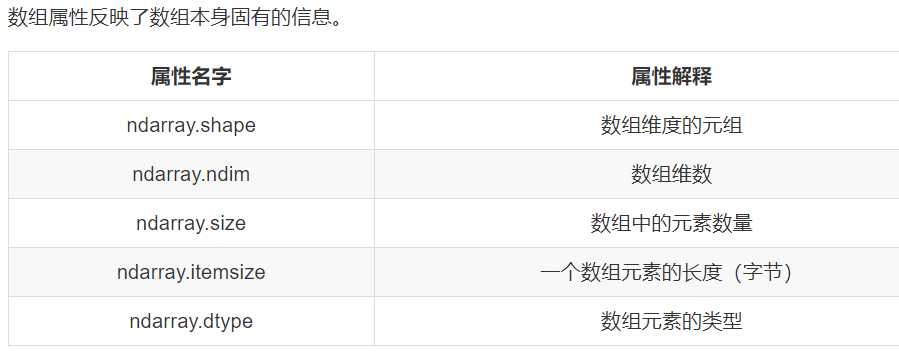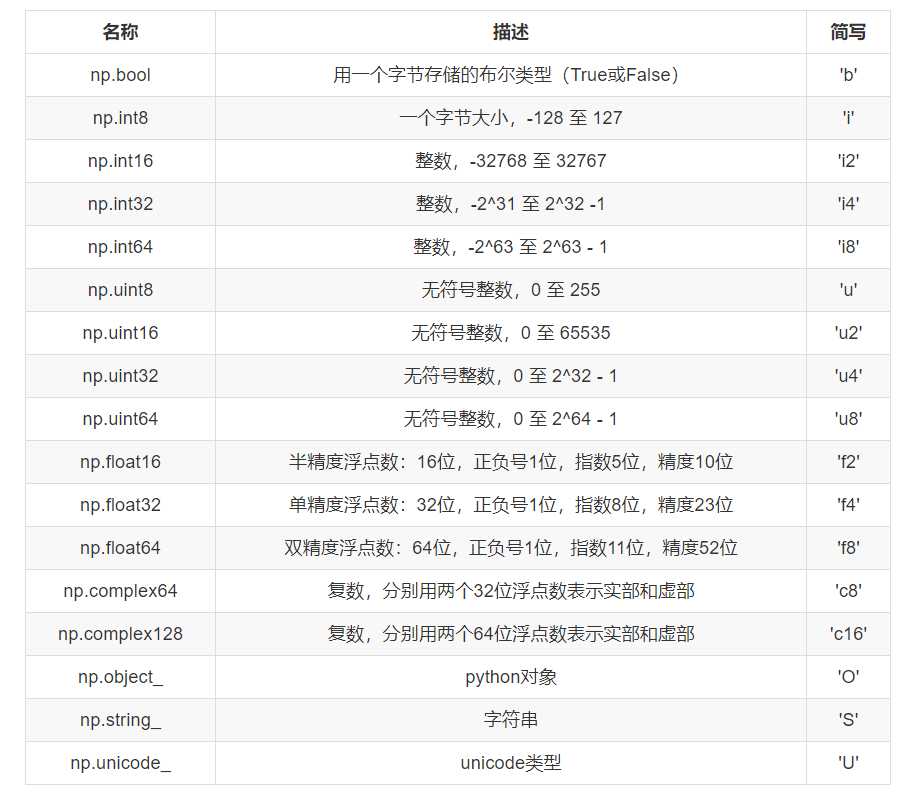NumPy科学计算库
Posted hly97
tags:
篇首语:本文由小常识网(cha138.com)小编为大家整理,主要介绍了NumPy科学计算库相关的知识,希望对你有一定的参考价值。
Numpy(Numerical Python)是一个开源的Python科学计算库,用于快速处理任意维度的数组。
ndarray的属性:

1 >>> b=np.array([[0,1,2,3],[4,5,6,7],[8,9,10,11]]) 2 >>> b 3 array([[ 0, 1, 2, 3], 4 [ 4, 5, 6, 7], 5 [ 8, 9, 10, 11]]) 6 >>> b[0] 7 array([0, 1, 2, 3]) 8 >>> b[1] 9 array([4, 5, 6, 7]) 10 >>> b[2] 11 array([ 8, 9, 10, 11]) 12 >>> b.ndim 13 2 14 >>> b.shape 15 (3, 4) 16 >>> b.size 17 12 18 >>> b[0].ndim 19 1 20 >>> b[0].shape 21 (4,) 22 >>> b[0].size 23 4 24 >>> b[0][0] 25 0 26 >>> b[0][1] 27 1 28 >>> b[0,0] 29 0 30 >>> b[0,1] 31 1 32 >>>
ndarray的类型:

1 >>> a = np.array([[1, 2, 3],[4, 5, 6]], dtype=np.float32) 2 >>> a.dtype 3 dtype(‘float32‘) 4 5 >>> arr = np.array([‘python‘, ‘tensorflow‘, ‘scikit-learn‘, ‘numpy‘], dtype = np.string_) 6 >>> arr 7 array([b‘python‘, b‘tensorflow‘, b‘scikit-learn‘, b‘numpy‘], dtype=‘|S12‘)
生成0和1的数组:
- np.ones(shape, dtype)
- np.ones_like(a, dtype)
- np.zeros(shape, dtype)
- np.zeros_like(a, dtype)
1 >>> ones = np.ones([4,8]) 2 >>> ones 3 array([[1., 1., 1., 1., 1., 1., 1., 1.], 4 [1., 1., 1., 1., 1., 1., 1., 1.], 5 [1., 1., 1., 1., 1., 1., 1., 1.], 6 [1., 1., 1., 1., 1., 1., 1., 1.]])
>>> np.zeros_like(ones)
array([[0., 0., 0., 0., 0., 0., 0., 0.],
[0., 0., 0., 0., 0., 0., 0., 0.],
[0., 0., 0., 0., 0., 0., 0., 0.],
[0., 0., 0., 0., 0., 0., 0., 0.]])
a = np.array([[1,2,3],[4,5,6]])
# 从现有的数组当中创建
a1 = np.array(a)
# 相当于索引的形式,并没有真正的创建一个新的
a2 = np.asarray(a)
等差数组:np.linspace (start, stop, num, endpoint)- 创建等差数组 — 指定数量
- 参数:
- start:序列的起始值
- stop:序列的终止值
- num:要生成的等间隔样例数量,默认为50
- endpoint:序列中是否包含stop值,默认为ture
1 np.linspace(0, 100, 11)
2 array([ 0., 10., 20., 30., 40., 50., 60., 70., 80., 90., 100.])
数字数列数组:np.arange(start,stop, step, dtype)
- 创建等差数组 — 指定步长
- 参数
- step:步长,默认值为1
1 np.arange(10, 50, 2)
2 array([10, 12, 14, 16, 18, 20, 22, 24, 26, 28, 30, 32, 34, 36, 38, 40, 42, 3 44, 46, 48])
等比数组:np.logspace(start,stop, num)
-
创建等比数列
-
参数:
- num:要生成的等比数列数量,默认为50
1 np.logspace(0, 2, 3) 2 array([ 1., 10., 100.]) 3 >>> np.logspace(1, 5, 5,base=2) 4 array([ 2., 4., 8., 16., 32.])
以上是关于NumPy科学计算库的主要内容,如果未能解决你的问题,请参考以下文章